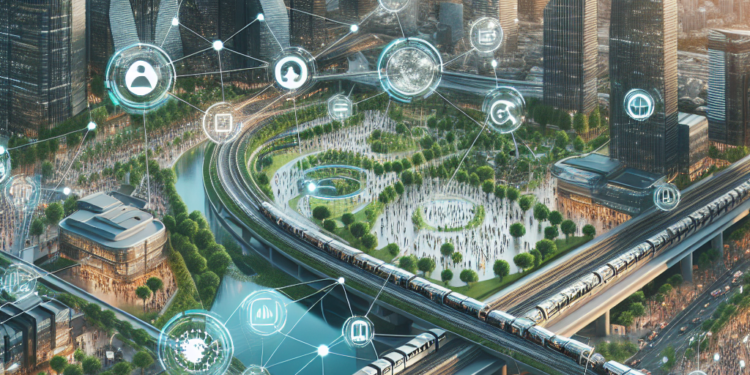Artificial Intelligence (AI) is revolutionizing every sector of the economy, and urban planning is no exception. The use of AI in urban planning is changing the way cities are designed, managed, and developed. From predicting traffic patterns to optimizing energy usage, AI is helping cities become smarter, more efficient, and more sustainable.
One of the key advantages of using AI in urban planning is its ability to process vast amounts of data quickly and effectively. Cities generate a massive amount of data every day, from traffic flow to energy consumption to population demographics. AI algorithms can analyze this data in real-time, providing valuable insights that help city planners make more informed decisions.
For example, AI can be used to predict traffic patterns and identify congestion hotspots. By analyzing data from sensors, cameras, and GPS devices, AI algorithms can predict when and where traffic jams are likely to occur. This information can then be used to optimize traffic flow, reduce congestion, and improve overall transportation efficiency.
AI can also help cities reduce energy consumption and carbon emissions. By analyzing data from smart meters, buildings, and transportation systems, AI algorithms can identify opportunities to optimize energy usage and reduce waste. For example, AI can suggest ways to adjust building temperature settings, optimize traffic signal timings, and promote the use of public transportation, all of which can help reduce energy consumption and greenhouse gas emissions.
In addition to optimizing traffic flow and energy usage, AI can also help cities better plan for future growth and development. By analyzing historical data and trends, AI algorithms can predict how cities will grow and change over time. This information can then be used to inform decisions about infrastructure investments, land use planning, and zoning regulations.
For example, AI can help city planners identify areas that are likely to experience population growth and recommend where new housing developments, infrastructure projects, and public services should be located. By using AI to forecast future growth and development, cities can better plan for the needs of their residents and ensure sustainable, well-planned growth.
AI can also help cities improve public safety and emergency response. By analyzing data from sensors, cameras, and social media, AI algorithms can detect patterns and anomalies that may indicate criminal activity or emergencies. For example, AI can analyze video footage to identify suspicious behavior, monitor social media posts for signs of unrest, and predict where crimes are likely to occur. This information can then be used to deploy police resources more effectively, identify high-risk areas, and prevent crimes before they happen.
In addition to improving public safety, AI can also help cities respond more effectively to emergencies and natural disasters. By analyzing data from sensors, cameras, and other sources, AI algorithms can detect signs of disasters such as floods, fires, or earthquakes. This information can then be used to coordinate emergency response efforts, mobilize resources, and evacuate residents as needed.
Overall, the use of AI in urban planning has the potential to revolutionize the way cities are designed, managed, and developed. By leveraging the power of AI algorithms to analyze vast amounts of data, cities can make more informed decisions, optimize resources, and improve the quality of life for their residents.
However, there are also challenges and concerns associated with the use of AI in urban planning. One of the key challenges is ensuring that AI algorithms are unbiased and transparent. AI algorithms are only as good as the data they are trained on, and if the data is biased or incomplete, the algorithms may produce inaccurate or unfair results.
For example, if AI algorithms are trained on historical data that reflects systemic biases or discrimination, the algorithms may perpetuate and even exacerbate these biases. This can lead to unfair outcomes for marginalized communities, perpetuate inequality, and erode trust in AI systems.
Another challenge is the potential for privacy violations and data breaches. AI algorithms rely on vast amounts of data to operate, and if this data is not properly secured, it can be vulnerable to hacking, misuse, and unauthorized access. This can raise serious concerns about the protection of personal information, the erosion of privacy rights, and the potential for surveillance and abuse.
Despite these challenges, the use of AI in urban planning offers tremendous potential to improve the efficiency, sustainability, and livability of cities. By harnessing the power of AI algorithms to analyze data, predict trends, and optimize resources, cities can better plan for the needs of their residents, respond to emergencies, and create more resilient and vibrant communities.
In conclusion, AI is playing an increasingly important role in urban planning, transforming the way cities are designed, managed, and developed. By leveraging the power of AI algorithms to analyze data, predict trends, and optimize resources, cities can become smarter, more efficient, and more sustainable. While there are challenges and concerns associated with the use of AI in urban planning, the potential benefits are immense, and the future of smart, data-driven cities looks brighter than ever.













